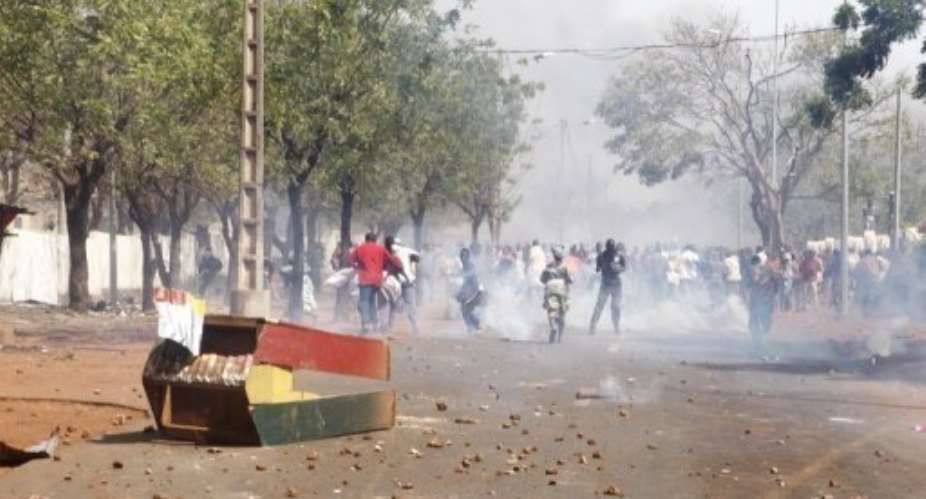BAMAKO (AFP) - The Malian army said Monday that soldiers and civilians had been summarily executed during a Tuareg offensive in the town of Aguelhok, as France accused the killers of adopting Al-Qaeda-style tactics.
Tuareg rebels launched an offensive on January 17 and have attacked several northern towns including Aguelhok as they demand autonomy for their nomadic desert tribe, a struggle which has seen several rebellions in past decades.
Death tolls have been hard to establish independently, but France on Monday condemned the extra-judicial killings of some 82 people in the town on January 24, which the Malian army confirmed.
"There were indeed summary executions on this day. People's throats were cut, others were simply shot in the head," said Colonel Idrissa Traore, head of the army's information service.
He said there were civilians among those killed, saying he believed these acts could only have been committed by Al-Qaeda in the Islamic Maghreb (AQIM).
French Development Minister Henri de Raincourt earlier Monday condemned the the killings as he returned from a visit to Mali last week.
"There was absolutely atrocious and unacceptable violence in Aguelhok. There were summary executions of soldiers, civilians," de Raincourt told RFI radio.
Raincourt said some of the victims had their throats slit, while others were shot in the head at point blank range. "What's important is that the hostilities stop as quickly as possible," he added.
"There's talk of around 100 who were captured and killed in cold blood," he added, saying the tactic "resembled that used by Al-Qaeda."
Separately, an official clarified the death toll.
"In total there were exactly 82 deaths, no civilians," a source close to the matter told AFP, citing Malian official sources.
Monday's announcement marked France's first suggestion of a link between Al-Qaeda's North African wing and the Azawad National Liberation Movement (MNLA) and other Tuareg rebels, who joined forces at the end of 2011.
Traore said he could not give the exact number of dead, but it was "about 60."
But an officer involved in burying those killed told AFP he had counted 97 dead soldiers and saw a military camp "completely destroyed, cars were burning."
The MNLA -- whose numbers include those who had returned from fighting in Libya for Moamer Kadhafi -- is waging the largest offensive by the Tuareg since 2009.
At least, 20,000 people have fled the fighting to neighbouring Mauritania, Burkina Faso and Niger, according to aid agencies. Some have also fled to Algeria.
Malian President Amadou Toumani Toure briefly attended an education conference in Burkina Faso Monday, where government says some 10,000 Malians are seeking refuge.
Among the refugees is Hassane Ag Mehdy a paramilitary commander who defected from the force and told local press the rebels were demanding "independence for northern Mali, no more, no less."
Fighting continued on Saturday, when government troops regained control of the town of Lere, which had been under rebel control for around 10 days.
The International Committee of the Red Cross (ICRC) has visited the area to evaluate the situation and to distribute rice, salt, oil and basic necessities to the 4,000 displaced individuals around the city of Aguelhok.
The Red Cross had said Thursday that "at least 30,000 people are displaced in Mali and living in extremely precarious conditions."
A nomadic community of some 1.5 million people, Tuareg of various tribes are scattered between Algeria, Burkina Faso, Libya, Niger and Mali.
Mali and Niger experienced uprisings as the Tuareg fought for recognition of their identity and an independent state in the 1960s, 1990s and early 2000s, with a resurgence between 2006 and 2009.
Many Tuareg left for Libya where they later fought for Kadhafi's regime, but after his death in October last year they returned, some heavily armed, to their home countries.





 Dumsor: Don't rush to demand timetable; the problem may be temporary — Atik Moha...
Dumsor: Don't rush to demand timetable; the problem may be temporary — Atik Moha...
 Space X Starlink’s satellite broadband approved in Ghana — NCA
Space X Starlink’s satellite broadband approved in Ghana — NCA
 2024 election will be decided on the grounds of the economy; choice of running m...
2024 election will be decided on the grounds of the economy; choice of running m...
 Dumsor: We're demanding less; just give us a timetable — Kwesi Pratt to ECG
Dumsor: We're demanding less; just give us a timetable — Kwesi Pratt to ECG
 Do I have to apologise for doing my security work, I won’t – Simon Osei-Mensah r...
Do I have to apologise for doing my security work, I won’t – Simon Osei-Mensah r...
 All my businesses have collapsed under Akufo-Addo — NDC Central regional chair
All my businesses have collapsed under Akufo-Addo — NDC Central regional chair
 Military, Prison Officers clash in Bawku, three injured
Military, Prison Officers clash in Bawku, three injured
 GRA-SML contract: MFWA files RTI request demanding KPMG report
GRA-SML contract: MFWA files RTI request demanding KPMG report
 Court threatens to call second accused to testify if NDC's Ofosu Ampofo fails to...
Court threatens to call second accused to testify if NDC's Ofosu Ampofo fails to...
 Family accuses hospital of medical negligence, extortion in death of 17-year-old...
Family accuses hospital of medical negligence, extortion in death of 17-year-old...
